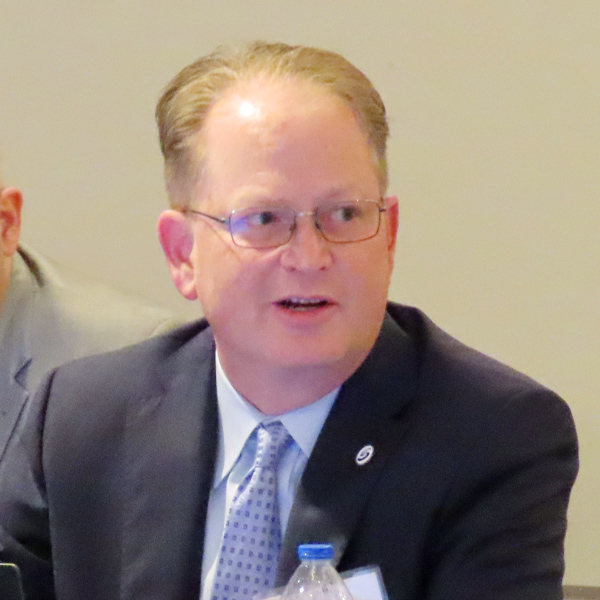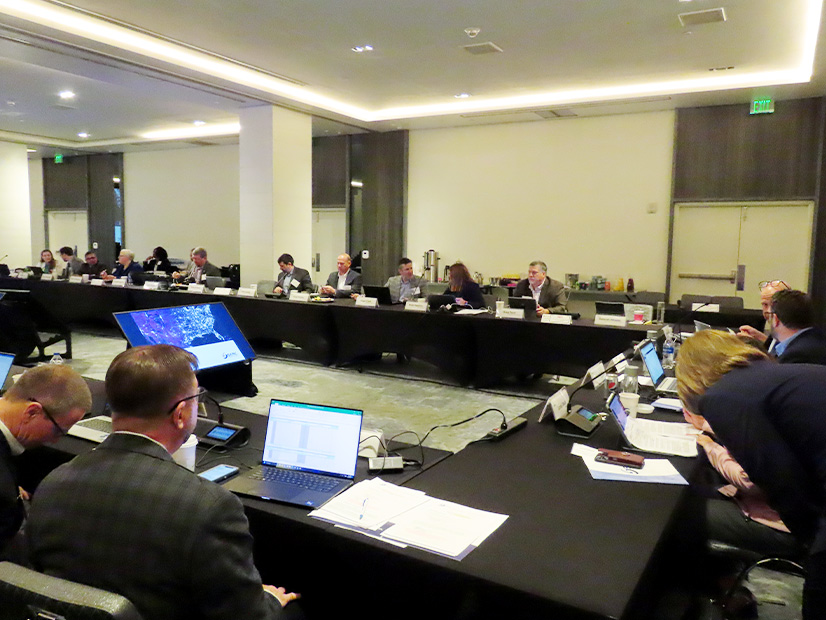FORT LAUDERDALE, Fla. — Representatives of SERC Reliability’s member entities joined the regional entity’s Board of Directors here for its first meeting of the year on Wednesday, during which attendees discussed the challenges the grid faces — including severe weather and physical violence — and SERC’s role in addressing them.
“When you’re looking at how [we are] going to navigate these waters, and how SERC can be the best region for its stakeholders and for its mission, it is that we have to be strategically focused; we can’t get overwhelmed with the trees and lose sight of the bigger picture that’s happening in the forest,” CEO Jason Blake said. “We must be advancing our operations in a way that makes sure that we’re not only successful today, but we are well positioned for tomorrow.”
Peterson Warns of Vulnerabilities to ‘Bad Guys’
Bill Peterson, SERC’s senior manager of training, outreach and communication, briefed those at the members’ meeting on the threat of physical violence — or as he called it, “bad guys, guns and bullets.”
His presentation opened with December’s attacks on two Duke Energy (NYSE:DUK) substations in Moore County, N.C. More than 40,000 of the utility’s customers lost power after unknown attackers damaged transformers at the substations with rifles, causing them to leak coolant; service was restored after four days in what Peterson called a “herculean effort” on the part of Duke’s crews. (See Duke Completes Power Restoration After NC Substation Attack.)
 SERC CEO Jason Blake (left) and Chair Lee Xanthakos | © RTO Insider LLC
SERC CEO Jason Blake (left) and Chair Lee Xanthakos | © RTO Insider LLC
Investigators have yet to identify the assailants involved in the incident, or any motive, but Peterson noted that the Moore County attacks have already provided inspiration for other malicious actors. For instance, he pointed out, neo-Nazi leader Brandon Russell — charged earlier this year with trying to disable electric substations in Baltimore — explicitly held up the December attacks as a model for his plot to cause mass chaos by setting off cascading outages in the city. (See Feds Charge Two in Alleged Conspiracy to Attack BGE Grid.)
Peterson also warned that transformers are more vulnerable to interference than many realize. Although the Moore County attacks drew national attention, with FERC calling for an investigation into NERC’s reliability standards, there were two other similar incidents in North Carolina in the previous and subsequent months that passed almost without comment.
In November four transformers at a substation in Jones County were found with bullet holes in their cooling fins; the incident left 17,000 customers without power. Then in January, a transformer at another substation was found leaking oil from bullet holes in its cooling fins. No outages were reported from this incident.
Peterson acknowledged that not all gunfire incidents are deliberate sabotage; he observed that bullet holes “tend to trend up around hunting season.” But he warned attendees that this should not obscure the real and growing threat of domestic violence on the system, noting that there are thousands of substations around the country, many located in rural areas and hard to protect, and that transformers in most facilities are highly visible from outside — an assessment with which board Chair Lee Xanthakos agreed.
“I was manager of [Dominion Energy’s] substation group for years, and I do remember having an incident where someone shot a fin on a transformer, [but] it didn’t cause an outage,” Xanthakos said. “So I think it happens a lot more than we think, but … it draws attention when there’s an outage. That’s when we notice it, but I think it’s happening all the time in the background.”
SERC Set for 10% Budget Rise
Board members approved SERC’s draft business plan and budget for 2024 at Wednesday’s meeting. The draft budget will now be submitted to NERC and posted for public comment; once the comments are in, SERC will revise the draft. The board will consider the final budget in June before sending it to NERC to be submitted to FERC, along with the rest of the ERO Enterprise budgets, by August.
 SERC CFO George Krogstie | © RTO Insider LLC
SERC CFO George Krogstie | © RTO Insider LLCSERC’s budget is set to rise by $2.9 million next year, CFO George Krogstie said, for a total of $31 million. The increase is partly because of the planned hiring of three full-time equivalent positions: two in information technology and security, and one in training.
Krogstie said the IT positions are needed in order to meet the growing cybersecurity challenges; as for the training hires, they will enable the RE to build a formal, comprehensive internal training program rather than the department-by-department approach in effect now. He acknowledged that the current approach is “not very efficient [and] not as effective as it needs to be.”
Krogstie reminded attendees that SERC’s lease on its office in Charlotte, N.C., expires in January 2025. The RE hopes to start setting aside money in 2024 for its office move, as well as for salary increases that will be necessary in order to keep its hiring competitive with the rest of industry.
Members Approve Director Slate
SERC also welcomed four new directors after members voted to approve them at Wednesday’s meeting. Christopher Peters from Entergy and Kevin Walz from Florida Public Utilities will represent the Investor-Owned Utility sector, replacing Ameren’s Shawn Schukar and Florida Power & Light’s Manny Miranda. Stacy Dochoda, formerly of the Florida Reliability Coordinating Council, joined as the ISO/RTO/Reliability Coordinator sector representative.
Members also agreed to renew the terms of independent Directors Deborah Wheeler and Shirley Bloomfield, along with Municipal sector representatives Tim Lyons and Ricky Erixton, and the Cooperative sector’s Greg Ford and Lisa Johnson.
Finally, Bob Dalrymple was confirmed to replace Arnold Singleton, who left the board in September. Dalrymple was chosen as his successor at the board’s last meeting in December. (See “NGC Describes Leadership Shuffle,” SERC Board of Directors Briefs: Dec. 14, 2022.)




